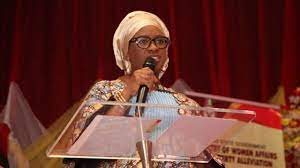Mrs Bolaji Dada, the Lagos State Commissioner of Women Affairs and Poverty Alleviation (WAPA), has restated government’s resolve to curb sexual harassment in tertiary educational institutions.
Dada made this known on Monday at a one-day stakeholders meeting organised by WAPA in collaboration with the United Nations Population Fund (UNFPA).
The forum was tagged” Domestication of Sexual Harassment Prohibition Policy in Tertiary Educational Institutions in Lagos State: Using Gender Lens.”
She said that the meeting aimed at exploring avenues to curb sexual harassment in tertiary institutions across the State.
“WAPA as a matter of duty, protects, supports and empowers all women within to achieve their full potentials socially, physically, economically and politically
“This training is of ardent view to introduce the anti-harassment policy to tertiary Institutions in Lagos State which already exists at the federal establishments in Nigeria.
“The aim of this policy is to address and prevent antagonistic situation that violates the dignity of students and employees at workplace,” she said.
The commissioner added that the Gov. Babajide Sanwo-Olu-led administration through the ‘T.H.E.M.E.S. Agenda’ has zero tolerance for all forms of abuses, particularly, sexual harassment
“The State Government has taken the lead through various legal and policy frameworks to support the rights of the girl child,“ she said.
Dr Esther Somefun, the Gender Reproductive Health Analyst of the UNFPA, said the agency had observed steady increase in sexual harassment in tertiary institutions in the country.
“Sexual abuse is rooted in power imbalances which many students, teaching and non-teaching staffers still encounter in their daily lives.
“Some of these harassments are reported while some still remain unreported and even those reported die natural deaths.
”There is still too much fear to speak up against abuses,” she said.
Somefun said UNFPA would continuously work with WAPA and other agencies to ensure that tertiary institutions were able to tackle what she called ”monsters who harass students.”








